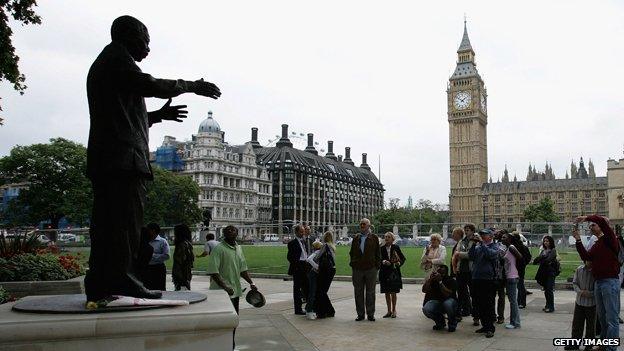Should we value extremism?
- Published
- comments

At the heart of our democracy is Parliament Square in Westminster, Around it, statues to honour great statesmen. But would the occupants of the plinths survive the government's proposed extremism test?
Nelson Mandela advocated the violent overthrow of the South African state - Margaret Thatcher described the ANC as "a typical terrorist organisation".
The British jailed Mahatma Gandhi for sedition - his extremist views too much for Prime Minister Lloyd George.
Jan Smuts, the South African prime minister venerated with a statue opposite the Houses of Parliament, was censured by the United Nations for his racist policies.
Winston Churchill, having been defeated in an election, famously described democracy as "the worst form of government, except for all the others that have been tried from time to time".
Under the proposals, ministers would be able to silence any group or individual they believe is undermining democracy or the British values of tolerance and mutual respect.
One can understand a government's determination to prevent extremism that might lead to radicalisation and terrorism. But where to draw the line? And indeed, how do we draw up a definition?
There is, it seems to me, an inherent contradiction between banning orders and the core British value that one should be tolerant of different viewpoints.
History tells us that the development of new ideas of governance and government require people to think radically. Extreme views are necessary to test the wisdom of the mainstream.
Would those who oppose homosexuality or multiculturalism or feminism be accused of threatening values of tolerance and equality? Could Russell Brand's argument against voting be regarded as threatening democracy?
Even before the legislation has been drafted one can hear the excited whispers of lawyers who know that arguments about what "undermining British values" may be a valuable source of income for years ahead.
It is one thing to legislate against activities which can be demonstrated to incite violence or hatred. Quite another to pass a law that can silence anyone who the government thinks has "dangerous views". What would Churchill, Gandhi or Mandela think?